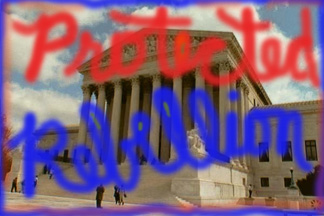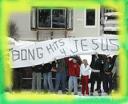
Drugs! Free Speech! Religious liberty! Holding the line against the rising tide of utter chaos in America’s schools! Plus—the return of Clinton-badgerer Kenneth Starr in all his self-righteous glory!
Today the Supremes will begin to hear arguments on an issue that has it all: Frederick v. Morse—otherwise known as the BONG HITS 4 JESUS case.
This is shaping up to be a high-stakes legal drama worth watching closely. It has the potential to overturn a landmark ruling that, for 38 years, has protected the free speech rights of American students from overzealous and/or punitive teachers and school administrators.
If the case has somehow escaped your attention, Frederick v. Morse lays out as follows:
On a snowy morning in 2002, when the Olympic torch was being carried through the streets of Juneau, Alaska en route to the Winter Games in Salt Lake City, the students from Juneau-Douglas High School were allowed to cut class to watch the relay, which happened to pass right in front of school. As the torch and the accompanying CNN camera crew approached, an eighteen-year-old Juneau-Douglass senior named Joseph Frederick hoisted up a 14-foot, white banner that was cheerily hand-painted with the message: BONG HITS 4 JESUS.

By all available accounts, young Joe was neither a stoner nor a drug activist. It was more that he was looking to prove a point to the school principal, Deborah Morse, with whom he already had a running battle of wills. (Frederick’s personal view of events is detailed rather interestingly and at length in an online treatise.) When Morse saw the sign, she barreled across the street, yanked it out of Frederick’s hands, and promptly suspended him from school for five days. After Fredrick invoked his First Amendment rights and quoted both Thomas Jefferson and Voltaire in rapid succession, a furious Morse told him he’d just bought himself an additional five days of suspension.
Frederick and his parents protested the suspension to the district. After all, they contended, Frederick came to the torch event from home that morning, not from school. And, most importantly, he was not standing on school property when he and several friends unrolled the banner. They were standing on the sidewalk directly across from the campus (where they hoped that the CNN cameras, and Morse, would see them).
District superintendent, Peggy Cowen, concluded that the school had the right to suspend Frederick since his message violated the school’s anti-drug policy.
With most kids, it would have ended there. But Frederick sued. He lost in federal district court, but the 9th U.S. Circuit Court of Appeals agreed that the principal had seriously overstepped and that, since Fredrick’s actions didn’t disrupt the function of the school or impinge on the rights of others, nor were they obscene or promoting of violence—they were, in fact, protected. The unhappy district, fearful that the suit would open the door to similar lawsuits seeking monetary damages, took the case to the Supreme Court.
Which brings us to today. In addition to the ACLU, those arguing in Frederick’s behalf include a boggling array of strange legal bedfellows—from drug and gay rights groups, to a string of conservative Christian organizations. The latter fear that a decision against Frederick will also impinge upon the rights of students’ individual religious expression, have joined in a series of strongly-worded Amicus Briefs.
The precedent at stake here is Tinker v. Des Moines, a 1969 case involving three students who wore black armbands to protest the Vietnam War. Back then, SCOTUS ruled that kids do not “shed their constitutional rights to freedom of speech or expression at the schoolhouse gate.”
The Tinker ruling has been considered relatively sacrosanct until the shooting at Columbine High School ushered in a new era of sub-zero tolerance and clamping down on student rights.
Now we have Ken Starr representing the school district. He is expected to argue that watching the torch relay was a school sponsored event, therefore the school had every right to snatch the banner and punish Frederick because free speech “may be banned if it is inconsistent with a school’s basic educational mission.
This is a lousy and dangerous argument
Imagine for a minute how the First Amendment might read with Starr’s line of reasoning appended:
“Congress shall make no law respecting an establishment of religion, or prohibiting the free exercise thereof; or abridging the freedom of speech, or of the press; or the right of the people peaceably to assemble, and to petition the government for a redress of grievances—unless such speech, religion or right to assemble is inconsistent with the basic mission of….”
Of what??? A school? A political party? A government’s preferred views?
There is no acceptable way to finish that sentence.
The US government has had plenty of preferred views< that were later proven to run counter to the nation’s health and well being.
Yes, Joe Frederick used a juvenile and deliberately provocative stunt to make a point with his school principal. But—stunt or no— it also happens to be an act of expression that is, from Constitutional perspective……protected.
Let’s hope it stays that way.

I’m in a quandary. I don’t like the ACLU and I don’t like government schools. So, I’ll have to take an alternate middle-ground position and say that the school should only moderate student speech when a student is on school property or has been marked present while away on a school function.
This tracks with Justice Hugo Black’s minority opinion in the Tinker case.
Black was in the minority, but he predicted the consequences of the majority ruling–the beginning of the breakdown of discipline in the schools. The parents of the Tinker kids should have demanded that their kids respect authority rather than let respect degenerate. Now, look at what we have.
How very un Dewey-ian! For non-educators out there, Dewey is the early 20th century educator who argued that public schools should be both a means to and models of democracy. Given that sentiment (and, of course, like any great idea, it’s entirely debatable — I just happen to agree with it), how can public schools prepare students to be citizens of a democracy if schools forbid students from standing up peacefully (black armbands in the Tinker case if I recall correctly) against a war that history has deemed so unwise? Or to put it another way: Do we want kids to grow up simply to take authority at its word? Or do we want them to consider logic and ethics when making decisions about their lives, their community, and their country?
We can all agree with the first amendment, but at the same we can all agree that there should be very few limitations (yelling fire in the crowded theater).
Some might have a problem with a student wearing a confederate flag arm band or holding up as sign that says “White Su…†or “Abortion = Mu…†or “Praise Je…†at a school sponsored event.
At PUBLIC/GOVERNMENT schools (k-12 to college) no speech should be limited including HATE speech even if this seems to lead to the death of a student.
Our schools should have the responsibility of teaching morals, values and ethics, which should modulate destructive behavior and educate students on the injustice of discrimination and move them from an amoral stage toward ever greater concern with the needs and feeling of others and come to understand the intrinsic virtue of being law abiding and ethical.
Its a minor nit to pick but I have to tell you that Justice Holmes was against FALSELY yelling “Fire!” in a crowded thatre. I assure you he had no troubl with warning people of a real conflagration!
Pokey wrote: Our schools should have the responsibility of teaching morals, values and ethics….
Not in my opinion. Parents and churches can do that. School administrators, in my experiences, have shortcomings in morals and ethics and are totally unqualified to teach those values.
I think eliminating values from the public schools is throwing the baby out with the bathwater.
Some administrators are afraid to teach about honesty, truthfulness and faithfulness because it would reflect so badly on the parents and teach disrespect instead.
Please tell me which one should not be taught.
Values to teach in school
• Friendliness
• Self-discipline
• Accountability
• Honesty
• Self-respect
• Integrity
• Sportsmanship
• Citizenship
• Kindness
• Temper
• Compassion
• Manners
• Temptation
• Courtesy
• The Golden Rule
• Patience
• Tolerance
• Confidence
• Perseverance
• Truthfulness
• Dependability
• Reliability
• Trustworthiness
• Determination
• Endurance
• Responsibility
• Self-Control
In any case values are often learned with classic literature assignments (is reading still taught in school?).
FIRE! – Yes, Yes (Falsely is what I meant).
have shortcomings in morals and ethics and are totally unqualified to teach those values.
You might be right about that Woody.
Pokey, the values that I would leave out are those of “situational ethics, “political correctness,” and “undermining parents.”
Guess who is representing the school board?
Kenneth Starr.
No further comment needed.
Great stuff as usual. Dahlia Lithwick took a good look at the Supreme Court arguments surrounding this case (though she gives poor Joe short shrift). There are a lot of tough issues around this case. I would argue that student’s ought to have a lot more free speech directly outside the classroom, even on school grounds, than they do during instruction. For example, while I would expect a teacher to require a student to remove an “Abortion Is Murder” armband during class, I think that student ought to freely wear that between periods on campus. The fact that this event takes place off campus gives the student even more leeway. Here’s the article: http://www.slate.com/id/2162161/pagenum/2/
At PUBLIC/GOVERNMENT schools (k-12 to college) no speech should be limited including HATE speech even if this seems to lead to the death of a student.
I can’t disagree more – students do not have a right to disrupt the educational mission of the school – i.e. cause riots, harm to others, etc. Much like adults do not have the right to infringe on the rights of others. While it may not be perfect, teachers and administrators have an obligation to model ethical and moral behavior especially when we act “in loco parentis” – in place of the parent when students are on our campuses and in our classrooms.
Student speech may be restricted on campus but the minute they leave the gates they are free to engage in speech that may otherwise be restricted on campus. This may not be what you agree with but it law.
As for Bong Hit Boy – he was not on school property, he was not at school that day and the relay was not an official school sponsored event since students technically were off campus and no permission slips were signed by parents allowing students to be off campus during instructional time. School will lose.
rlc, so what if Ken Starr represents the schools? He’s competent and able. Now, if you said that the ACLU represents the boy and that no further comment is needed, then that would make more sense.
He’s also a dishonest hack who violated the rules of the US Attorney’s office by admitting to leaking Grand Jury Testimony to the media. Compare and contrast with Fitzgerald who makes the sphynx sound like a chatterbox.
Oh, and he didn’t mention to anyone that hje had advised Paula Jones on her suit.
That’s why I’m enjoying Attorneygate so much. It’ll bring down this administration for believing that the only qualification for a prosecutor was his or her loyalty as a “Bushie” and Starr was the template.
rlc, okay, you’re not interested in justice for justice’s sake. Your interested in investigations to destroy your political enemies. Nice of you to admit it.